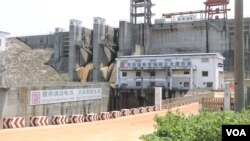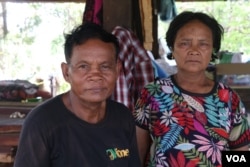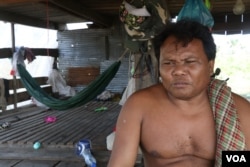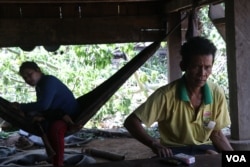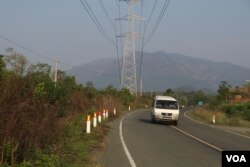For Khieu Him and Bun Kim Eng, orange trees provide hope.
The ethnic Chorng and Por indigenous minority villagers maintain an orange tree orchard on their land in Pursat province’s Veal Veng district in western Cambodia.
They hope for income from the oranges in the long-run, which can support them for the rest of their lives.
But they have lost hope since plans were drawn up for a hydropower dam that will flood their land.
The couple has grown about 1,000 orange trees for over the past three years and is expecting their first harvest after Khmer New Year, later in April.
“I grow these orange trees to support my living when I can no longer work,” he told VOA Khmer in a recent interview at his home, a few hundred meters from Anlong Krouch river where the dam will be constructed.
“I can’t grow like this anymore even though I have land,” said Him, who now stays at a house with his wife and 15-year-old grandson.
The Cambodian government last week announced an 80-megawatt hydropower dam on the Anlong Krouch river, which flows to the town of Pursat. The $230-million-dam will be constructed by SPHP Cambodia, a joint venture between Chinese and South Korean firms, under a build-operate-transfer agreement with the government.
If built, this dam will be the latest controversial large hydropower project in the area after a 120-megawatt dam was built in Atai in Pursat province’s Osoam commune, which opened in March 2014.
Him’s family is among the more than 350 families which will be impacted by the dam, according to Pramouy commune chief, Sek Samath.
The income from oranges can be over $10,000 per harvest, according to Him. He said the government should compensate him for lost future earnings.
Several villagers told VOA that their land, houses, and crops have been studied and evaluated by the company, but they have no idea when compensation will be granted and what kind of compensation will be offered.
“I will not agree and not leave the land [if compensation is below $2,000],” said another affected villager, Son Pros, a former soldier who lost his left leg when a landmine exploded.
“I can’t use the money to buy any [land] for living,” said Pros, who owns three hectares of land.
Another villager, Chab Chenda, who lives near the river, said farming and fishing in the village were profitable.
“It will be difficult [if we move]. We live here and it is easy for growing crops and vegetables. We will buy those at the market when moving,” said Chenda, 59.
“Here at the river, it is easy to catch fish for food as well whenever we need to,” he said.
Victor Jona, a spokesman of the Ministry of Mines and Energy’s department of energy, said the construction of the dam will take four years and begin later this year.
“I think this project helps build the national economy and we will pay suitable and acceptable compensation,” he said.
“Development always has impacts but we try to make it low.”
Late last year, Cambodia opened the country's largest hydropower dam, producing 400 megawatts, which impacted over 800 families from the indigenous communities. They had protested but then they accepted the compensation offer, including resettlement.
But dozens of families did not accept the compensation and remain near the flood zone.
Mak Bunthoeurn, NGO Forum coordinator, said discussions on compensation related to hydropower dams are always not well conducted.
“There is no comprehensive discussion over the compensation with the affected community,” he said. “Only the company and government are involved.”
Cambodia hopes to become energy self-sufficient by 2020 and hydropower plays an important role in that plan, says Jona.
Since mid-March, the government oversaw electricity cuts for six hours every day, claiming the country was experiencing power shortages.
Sek Samath, the local commune chief, said villagers had been banned from building houses or planting crops to make way for the dam.
Him and his wife urged the government to speed up the provision of compensation as soon as possible.
“I’m not protesting, but I ask for financial compensation if my place will be submerged,” she said. “I will take the money to buy land, a house, or something else.”
Him said he is satisfied to see his oranges growing, but it makes him sad when he is reminded of the dam.
“But when thinking of the dam, I can’t speak and it is even hard to breathe,” he said.




